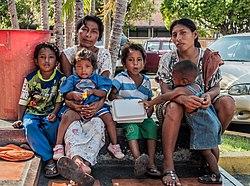Thousands of Venezuelans, escaping economic collapse and political repression under Nicolás Maduro, have found themselves forced to flee new uncertainties amid growing tensions in the United States during the Trump administration. Seeking stability and opportunity, many have turned their sights to Spain, a country sharing historical and linguistic ties. This migration wave highlights the complex challenges faced by Venezuelan expatriates navigating shifting political landscapes in both the Americas and Europe.
Venezuelan Migrants Escape Political Turmoil Under Maduro and Trump
Venezuelans have been caught in a relentless crossfire of political instability and economic hardship, first under Nicolás Maduro’s regime and later intensified by restrictive U.S. policies during the Trump administration. The combination of crippling hyperinflation, scarcity of basic goods, and political repression forced millions to seek safer havens abroad. Today, Spain stands as a prominent destination offering a beacon of hope for families desperate to rebuild their lives. The influx has reshaped migration flows, with growing communities establishing roots in Spanish cities like Madrid and Valencia.
The challenges faced by these migrants are multifaceted. Spain’s immigration system, while more welcoming than many, still poses bureaucratic hurdles. Meanwhile, integration into the social and labor markets requires overcoming language barriers and cultural differences. Below is a glimpse into some key factors influencing Venezuelan migration patterns toward Spain:
- Political Persecution: Threats and crackdowns on dissent prompted early departures.
- Economic Collapse: Severe shortages of food and medicine exit point.
- U.S. Sanctions: Intensified economic pressure limiting remittances and trade.
- Family Networks: Established Venezuelan diaspora in Spain aids newcomers.
| Year | Venezuelan Arrivals in Spain | Main Reason for Migration |
|---|---|---|
| 2015 | 25,000 | Economic Collapse |
| 2018 | 50,000 | Political Repression |
| 2020 | 70,000 | Sanctions Impact |
Challenges Faced by Venezuelan Refugees Integrating into Spanish Society
Despite Spain’s shared language and cultural ties, Venezuelan refugees grapple with significant barriers upon arrival. Employment poses one of the largest hurdles, as many face difficulties transferring their professional qualifications or securing stable jobs in a competitive labor market. Additionally, bureaucratic obstacles related to residency permits and social services often prolong uncertainty, fostering a sense of instability. The challenge is magnified by limited access to affordable housing and healthcare, forcing many into precarious living conditions that impede full integration.
Social integration remains equally complex, as Venezuelans encounter both implicit prejudice and stereotyping in some communities. This results in social isolation that hinders community building and emotional well-being. Language nuances and cultural adaptation also contribute to a sometimes fraught experience, especially for older refugees less fluent in European Spanish. Below is a snapshot of common integration challenges faced by Venezuelans in Spain:
| Challenge | Description | Impact |
|---|---|---|
| Employment | Recognition of qualifications, job competition | High unemployment rates |
| Bureaucracy | Lengthy residency permit processes | Legal uncertainty |
| Housing | Lack of affordable, secure options | Overcrowding, instability |
| Social Acceptance | Prejudice, stereotyping | Isolation, reduced community ties |
- Limited access to public services due to documentation issues
- Cultural gaps causing misunderstandings in daily life
- Psychological stress from displacement and instability
Policy Recommendations to Support Venezuelan Asylum Seekers in Spain
To effectively address the challenges faced by Venezuelan asylum seekers arriving in Spain, the government should implement streamlined asylum procedures that reduce waiting times and increase transparency. This includes the expansion of legal aid services and multilingual support to ensure applicants fully understand their rights and obligations. Additionally, fostering partnerships with local NGOs and community organizations can create a more comprehensive support network, offering essential services such as housing, psychological counseling, and job placement programs tailored to the unique experiences of asylum seekers.
Investment in integration policies must also prioritize access to education and vocational training, enabling refugees to contribute to Spain’s labor market and society at large. The following table highlights key policy areas with suggested actions:
| Policy Area | Recommended Actions |
|---|---|
| Legal Support | Expand pro bono legal aid & interpreters |
| Social Services | Partnerships with NGOs for housing and counseling |
| Employment | Vocational training & job placement programs |
| Education | Language courses and school integration support |
Moreover, public awareness campaigns should be launched to combat xenophobia and foster social cohesion. By promoting a narrative that recognizes the resilience and potential contributions of Venezuelan refugees, Spanish society can build a more inclusive environment where newcomers are encouraged to thrive and rebuild their lives.
The Way Forward
As Venezuelans continue to escape political and economic turmoil under Nicolás Maduro and the recent challenges posed by shifting U.S. policies during the Trump administration, Spain has emerged as a key refuge offering hope and stability. Their journeys underscore the ongoing human impact of geopolitical strife and the urgent need for comprehensive international responses to displacement crises affecting the Western Hemisphere.




